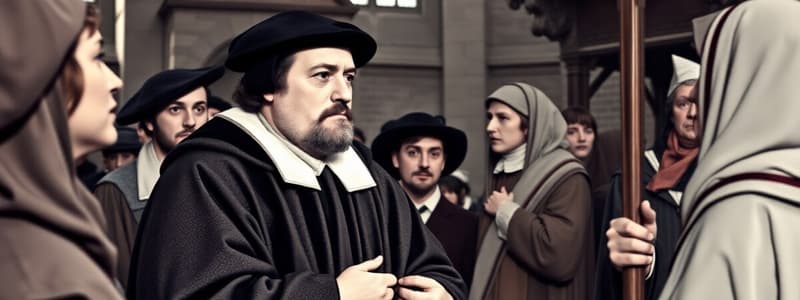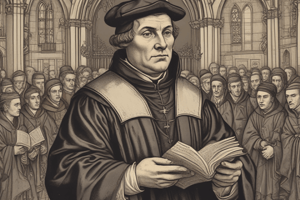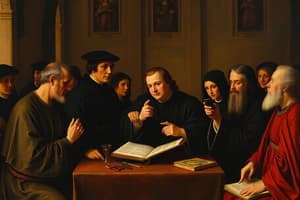Podcast
Questions and Answers
What initiated the Reformation in the early 16th century?
What initiated the Reformation in the early 16th century?
- The publishing of the Ninety-five Theses (correct)
- The decline of church authority
- The Indulgence Controversy
- The Peace of Westphalia
How did the invention of the moveable type printing press contribute to the Reformation?
How did the invention of the moveable type printing press contribute to the Reformation?
- It allowed the church to spread its teachings more effectively.
- It decreased the number of religious conflicts.
- It eliminated the need for church authorities.
- It made the Bible and new ideas more accessible to the public. (correct)
Which event marked the end of the Reformation period?
Which event marked the end of the Reformation period?
- The publication of the Ninety-five Theses
- The conclusion of the Thirty Years’ War (correct)
- The signing of the Treaty of Augsburg
- The rise of Protestant churches
What was one of the main criticisms that led to the Reformation?
What was one of the main criticisms that led to the Reformation?
What role did translations of the Bible play in the Reformation?
What role did translations of the Bible play in the Reformation?
What was the Indulgence Controversy associated with?
What was the Indulgence Controversy associated with?
Which statement best describes the relationship between church and state during the Reformation?
Which statement best describes the relationship between church and state during the Reformation?
What was a consequence of the Renaissance on the Reformation?
What was a consequence of the Renaissance on the Reformation?
What practice did Martin Luther criticize in his Ninety-Five-Theses?
What practice did Martin Luther criticize in his Ninety-Five-Theses?
What was one significant outcome of Martin Luther's actions?
What was one significant outcome of Martin Luther's actions?
Which event marked the beginning of the Protestant Reformation?
Which event marked the beginning of the Protestant Reformation?
Which role did Frederick III of Saxony play in relation to Martin Luther?
Which role did Frederick III of Saxony play in relation to Martin Luther?
What was one effect of the Counter-Reformation initiated by Pope Paul III?
What was one effect of the Counter-Reformation initiated by Pope Paul III?
What was one cause of the Thirty Years’ War?
What was one cause of the Thirty Years’ War?
How did the Reformation contribute to the development of capitalism in Europe?
How did the Reformation contribute to the development of capitalism in Europe?
What was one of the major consequences of weakened church authority during the Reformation?
What was one of the major consequences of weakened church authority during the Reformation?
Flashcards
Reformation
Reformation
A major religious movement in Europe during the 16th and 17th centuries that resulted in new Protestant churches separating from the Roman Catholic Church.
What triggered the Reformation?
What triggered the Reformation?
Martin Luther's publication of the Ninety-five Theses in 1517 marked the beginning of the Reformation.
Renaissance
Renaissance
A period of renewed interest in classical learning and arts that weakened the authority of the Church.
Printing Press
Printing Press
Signup and view all the flashcards
Conflict between church and state
Conflict between church and state
Signup and view all the flashcards
Indulgence Controversy
Indulgence Controversy
Signup and view all the flashcards
Indulgences
Indulgences
Signup and view all the flashcards
Pope Leo X
Pope Leo X
Signup and view all the flashcards
Martin Luther
Martin Luther
Signup and view all the flashcards
Ninety-Five Theses
Ninety-Five Theses
Signup and view all the flashcards
Protestant Reformation
Protestant Reformation
Signup and view all the flashcards
Counter-Reformation
Counter-Reformation
Signup and view all the flashcards
Council of Trent
Council of Trent
Signup and view all the flashcards
Absolutism
Absolutism
Signup and view all the flashcards
Capitalism
Capitalism
Signup and view all the flashcards
Study Notes
The Reformation
- Major religious movement in Europe, 16th and 17th centuries
- Began with Martin Luther's Ninety-Five Theses (1517)
- Ended with the Peace of Westphalia (1648)
- Led to religious divisions within Christendom, splitting Protestant churches from the Roman Catholic Church
Background of the Reformation
- Renaissance weakened Church authority
- Spread of new ideas challenged traditional views
- Printing technology (e.g., Gutenberg press) sped up the spread of new ideas and knowledge
- Translations of the Bible into vernacular languages made it more accessible
- Conflicts arose between church and state power
- Allegations of corruption within the church prompted questioning of its legitimacy
- Indulgence Controversy in the 16th century
Development of the Reformation
- Indulgences offered by the Church to fund St. Peter's Basilica
- Martin Luther criticized the selling of indulgences in his Ninety-Five Theses (1517)
- Theses challenged Church interpretations and practices
- Luther was excommunicated for his criticisms
- Protected by Frederick III of Saxony, he established the Lutheran Church
- Inspired the creation of other Protestant churches (e.g., Baptists, Methodists, Calvinists)
The Counter-Reformation
- Organized by Pope Paul III, council of Trent attempted to address concerns of the Catholic Church
- Religious orders and societies (e.g., Jesuits) helped spread the teachings of Catholicism
Impact of the Reformation
- Religious conflicts and wars divided Europe
- Thirty Years' War (1618-1648) exemplified these conflicts
- Rise of Absolutist rulers in Europe; weakening of Church authority
- Increased importance of secular education and intellectual development
- Separation of education and religion
Economic and Social Development
- Rise of capitalism connected to the Reformation
- Protestantism promoted hard work, virtue, and the value of worldly life
- Laid the foundations for capitalism
Studying That Suits You
Use AI to generate personalized quizzes and flashcards to suit your learning preferences.




